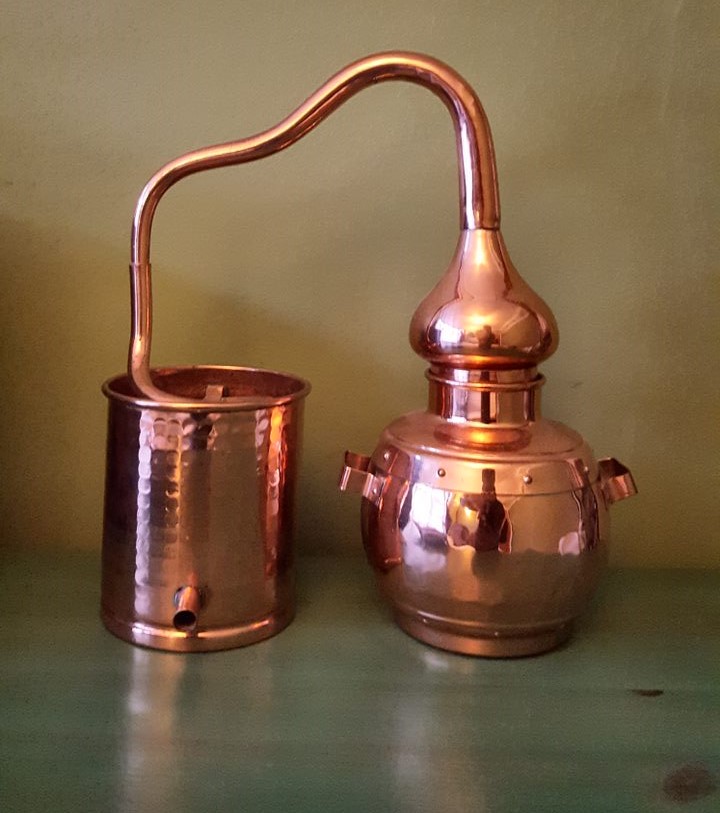What is an Alembic by Wimbledon Acupuncture and Herbs

An alembic is an ancient alchemical still used for distilling and purifying liquids. It is the predecessor of modern stills used for distilling commercial spirits like whisky or vodka.
The word alembic originates from Arabic al-inbiq which itself originated from Ancient Greek ambix (= a cup or beaker).
The ancient Greek physician Dioscorides, one of the patriarchs of the Western medical tradition, mentions in his De Materia Medica (c.50 CE) an ambix being used for collecting condensed mercury.
Depictions of alembics first appear in the writings of the Greek alchemists Cleopatra the Alchemist (c.3rd CE), Zosimos of Panopolis (c.300 CE) and Synesius (373-414 CE).
However, the invention of the alembic, according to Zosimos of Panopolis, is attributed to Mary the Jewess (aka Mary the Prophetess) an early alchemist in first century Alexandria, Egypt, who is considered by some to be one of the earliest alchemical writers.
Later works on alembics appear during the Islamic Golden Age and alchemy was reintroduced to Europe by the Arab invasion of Spain in the 8th century.
Arabic alchemist Abu Musa Jabir ibn Hayyan designed the alembic pot still as seen above, and discovered a clear flammable liquid (alcohol) could be distilled from heating wine in it.
In Andalusia, Arab agriculturalist Ibn-Al-Iwamm in his Kitab al-Filaha (Book of Agriculture) describes the use of an anbik for making rosewater.
Alembics are also mentioned in Mafatih al-Ulum (Book of Sciences) by Khwarizmi the 10th century Iranian poet and Kitab al-Asrar (Book of Secrets) by al-Razi the 9th century Iranian physician, philosopher and alchemist who refined the use of distilling alcohol using alembics. Alcohol was used by Islamic alchemists for the preparation of medicines and in rituals.
Islamic alchemists having discovered how to distill alcohol then realised this process could be used to extract and concentrate the essence of aromatic plants, in particular Rosewater, but also other medicinal herbs creating what are known as aromatic waters. These are distilled waters extracted from infusions of aromatic herbs rich in essential oils which can be applied medicinally. Examples of these medicinal aromatic waters could still be found in pharmacies until recently, such as peppermint water for indigestion, Dill water for colic in babies, distilled Witch Hazel for bruising and Rosewater as a cosmetic for toning the skin. These aromatic waters could be further distilled to extract the pure essential oils.
The alembic was an object central to the practice of alchemy which was the antecedent of modern chemistry.
The object of alchemy was to purify or transmute base substances like lead into a pure and precious substance like gold or the Philosophers Stone or the Elixir of Life.
Alchemy can be found in many of the worlds ancient cultures; the Egyptians, Greeks, Arabs, Persians, Indians and Chinese, but also Africa where the smelting of metals is first thought to have taken place, itself an alchemical process.
The word alchemy is derived from the Arabic al-kimiya which is derived from the Greek khemeia itself derived from the Coptic Egyptian word keme derived from the ancient Egyptian word kmt = the Land of the Black Earth, the name the Egyptians used to describe themselves and Egypt itself.
Therefore alchemy/ khemeia can be seen to refer to an ancient Egyptian art or science of metallurgical and ceremonial practices.
The Roman Emperor Diocletian (c.300 CE) banned alchemy and ordered the burning of all books on the subject as he believed they were Egyptian black arts.
Alchemy can be interpreted on many levels. It can be read literally as a physical process to turn lead into gold or transmute one material substance into another and thus eventually in Europe developed into modern chemistry.
However it can also be read, as it was in the ancient world, as a philosophical metaphor for spiritual development aiming to transmute the consciousness of the mundane self into a pure awareness of its ultimate spiritual nature as a spark of the divine.
On a practical level alchemy is still used in the preparation of aromatic waters, essential oils, herbal tinctures, spagyric extracts and homeopathic remedies, as well as in the making of a myriad of modern industrial chemical and pharmaceutical products (eg. crude oil is distilled to produce a range of different fuels and distillation is also a method of desalinating water).
